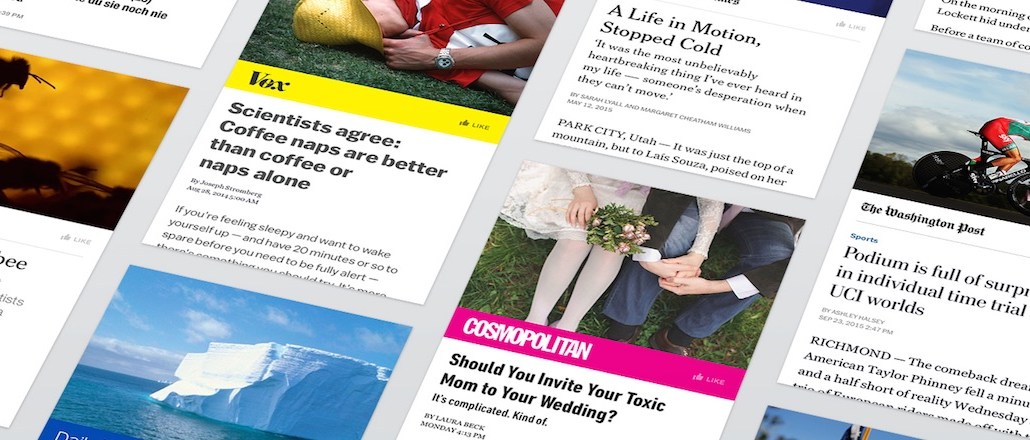Last chance to save on Digiday Publishing Summit passes is February 9

The distinction between marketers and publishers is getting increasingly blurred. Facebook, which created Instant Articles a year ago to make publishers’ articles load faster, is now giving that tool to brands. Intel is the first to take advantage, posting content from its digital tech-focused publication, iQ, as Instant Articles starting last week.
Founded in 2012, iQ is now is translated into 17 languages with editions around the world. In the U.S., it’s staffed by three Intel employees with help from contractors. The U.S. edition posts seven to 10 articles a week and reaches 1 to 5 million readers a month, mostly through paid social distribution, according to Intel. The goal is to get people to associate Intel with cutting-edge technology as the company tries to shift its perception as a PC maker to a tech brand involved in cloud computing and connected devices.
Because most of iQ’s reach is from Facebook, Instant Articles was a natural fit, said Becky Brown, vp of digital marketing and media for Intel. IQ is planning to publish half its articles this way, and just like a traditional publisher, comparing the engagement rates with those of regular posts to evaluate whether to expand its use.
“The whole experience is better for users in general, but we’re taking it a little slow so we don’t overextend ourselves,” Brown said.

Brown said the move to Instant grew out of several conversations Intel had with Facebook, and it builds on Intel’s long experience with Facebook, where it has long experimented with formats from dark posts to autoplay video to photo posts.
“We put a good case forward and how we felt this would be a much better experience for the customer,” she said. “We believe we’re a publisher, based on engagement and feedback we get from articles we publish.”
So far, Intel is the only brand publishing to Instant, but Facebook has no apparent rules limiting brands’ use of the tool. It only cares that the organization has an existing publishing operation and puts out content on a regular basis that meets its standards, and while a lot of marketers create their own content, fewer have dedicated publishing operations the way Intel does. For those that don’t publish regularly, Facebook has created more ways for them to advertise, including sponsored posts via traditional publishers’ Instant Articles and Canvas ads, which are multimedia ads that run in the news feed.
Instant Articles has been fraught with issues for traditional publishers because Facebook has been slow in giving them ways to monetize the articles. And whereas many publishers want to get people back to their own sites, where they have full control over their ad sales and the user experience, and Instant Articles is designed to keep people in the app.
Intel is different in that it doesn’t need to monetize its iQ articles through advertising or necessarily drive readers back to its site. It does, however, want to get people to read its articles and use Instant Articles to get people to subscribe to its email newsletter. And with most of its social traffic being paid for now, if Instant Articles lead to stronger engagement, one option is for Intel to decrease the amount of spending it puts behind social distribution.
Brown said she hopes that having iQ content run along with traditional publishers in Instant Articles, with their trademark lightning bolt icon, will help get people to start thinking of Intel as a publisher, too. “We aspire to be a true publisher and not just act like one,” she said. “This is a wonderful move to signal we’re not just an advertiser; we have content that’s relevant to the conversation, to cultural movements, to things that are on people’s minds.”
Traditional publishers might worry that the entry of marketers to Instant Articles might undermine their status on Facebook. But they shouldn’t — at least not yet. People don’t mistake branded content for actual journalism, although it remains to be seen if publishing branded content on third-party venues changes that, said Tom Rosenstiel, executive director of the American Press Institute.
Publishers still have a big advantage over marketers on Facebook, with their brand equity, organic reach and publishing experience, pointed out Steve Rubel, chief content strategist for Edelman. Rubel said brands have nothing to lose by publishing to Instant Articles (and has been advising clients to do just that) but they’re better off running sponsored content with publishers on Facebook.
“One of the huge upsides of sponsored content is the halo of being closely affiliated with the media brands,” he said. “Any brand has to overcome the fact that it’s branded content.”
More in Marketing

In Q1, marketers pivot to spending backed by AI and measurement
Q1 budget shifts reflect marketers’ growing focus on data, AI, measurement and where branding actually pays off.

GLP-1 draws pharma advertisers to double down on the Super Bowl
Could this be the last year Novo Nordisk, Boehringer Ingelheim, Hims & Hers, Novartis, Ro, and Lilly all run spots during the Big Game?

How food and beverage giants like Ritz and Diageo are showing up for the Super Bowl this year
Food and beverage executives say a Super Bowl campaign sets the tone for the year.





